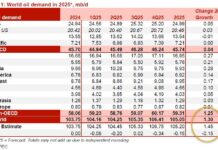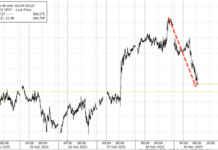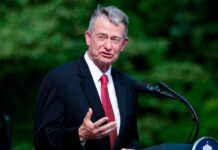TASS drew attention last week to what Chief of the Defense Staff of France Thierry Burkhard told the National Assembly during a closed hearing of the National Assembly National Defense and Armed Forces Committee on 31 January that was only just recently published on the National Assembly’s website here. France’s top military official neither confirmed nor denied Le Monde’s report around that time about sharing French bases with the US and others when asked about it but described the idea as “desirable”.
This plan would “reduce our visibility while maintaining the minimum footprint necessary to keep our access open”, or in other words, lessen the likelihood of the public protesting these neo-colonial outposts by scaling back France’s presence there and partially replacing it with America’s. The Ivory Coast and Senegal are much more strategic for the US than Chad and Gabon because the first two abut the newly formed Sahelian Alliance/Confederation’s core countries that cultivated close ties with Russia.
It was explained in September “Why The US Is Responsible For France’s Withdrawal From Niger”, which can be summarized as Washington backstabbing Paris for the “greater geopolitical good” of retaining Western influence in this part of Africa instead of voluntarily ceding it to Russia. Although this approach now appears to have failed in Niger after that country just scrapped its American base deal, it’s arguably still the paradigm through which the US is engaging with the Ivory Coast and Senegal.
The only possible way for France to feel more confident that the decades-established neo-colonial ties upon which its macroeconomic stability nowadays depends won’t be suddenly lost is to proactively cede some of its influence to the US with the expectation that this will dilute anti-French sentiment. It’s unclear whether France was promised anything from the US in exchange as a modern-day “destroyers-for-bases” deal, but even if it was, this was still done from a position of desperation and weakness.
The Sahelian Alliance/Confederation represents a new regional integration platform that could grow to include other countries that follow in its members’ footsteps by having their own patriotic military coups (multipolar revolutions) and then defecting from the Western-controlled ECOWAS bloc like they just did. Guinea is the top contender due to its recent political history and having the geographic capability to provide the neighboring Sahelian Alliance/Confederation with reliable sea access.
It was precisely because of this possibility that ECOWAS finally lifted sanctions on its post-coup government last month as well as those that it had earlier imposed on the Sahelian Alliance/Confederation’s three members of Burkina Faso, Mali, and Niger. The purpose was to preemptively avert the scenario of Guinea defecting from their bloc if its leadership realized how much it could profit by being that neighboring one’s only reliable access to the sea in those prior circumstances.
ECOWAS’ lifting of sanctions against their countries (targeted ones against their officials will remain for now) was meant to reassure Guinea that there’s no need to “overreact” while also re-establishing ECOWAS-Sahelian trade ties on humanitarian pretexts. The last-mentioned development masked the strategic intent of keeping that northern bloc in a relationship of complex mutual economic interdependence with the southern one from which its members just defected.
All of this is intended to stem the influence of Russia across West Africa in the wake of France’s retreat that began in the aftermath of the Sahelian states’ spree of patriotic military coups. Observers should note that Burkhard’s participation in the National Assembly’s closed hearing came just days after the Sahelian Alliance/Confederation defected from ECOWAS and a little less than a month before ECOWAS lifted its sanctions against those three countries and Guinea.
His words therefore represent a snapshot of French strategic thought at this historical moment when ECOWAS lost is Sahelian members and Paris was panicking about what to do next. Recalling Western fears that the now-rebranded Wagner might facilitate more patriotic military coups in the region, which President Putin denied in an interview last week that Russia ever played any role in, it makes sense why France would consider letting the US jointly operate out of its bases in the Ivory Coast and Senegal.
The Western media already fearmongered a year back that Wagner was supposedly plotting to target the Ivory Coast next, while Senegal’s present political crisis that first began to materialize last summer started heating up around the end of January when Burkhard addressed the National Assembly. These countries are thus considered possible “targets” of the Russian-partnered Sahelian Alliance/Confederation, hence the need to “protect” them more than Chad and Gabon.
Regarding those last two, Chad has impressively recalibrated its previously Western-centric foreign policy to pragmatically balance between that bloc and Russia, while Gabon’s coup last year was due to purely domestic issues and wasn’t anti-French in any way since the country still voluntarily remains in its orbit. They’re accordingly less of a priority for the US to deploy to for preserving Western influence than the Ivory Coast and Senegal, which explains why the latter are the most likely places that this’ll happen.
In that event, the US will be flexibly adapting to regional developments in a way that makes the most effective use of France’s neo-imperial legacy there, which could help it keep the Sahelian Alliance/Confederation in check. This is especially so if drones are deployed to its potentially shared Ivorian base with France per the Wall Street Journal’s report in early January that the US was planning to operate such systems out of that country, Ghana, and Benin, all of which abut that neighboring bloc.
The anti-terrorist pretext is likely true to an extent but also probably exaggerated as well in order justify establishing better monitoring mechanisms to keep an eye on Russian activity in those three northern countries. The Ivory Coast is the easiest of all three for the US to do this in since Burkhard said later that same month that it’s “desirable” for France to share its bases there with that country, which the West already fearmongered last year could supposedly soon be targeted by the now-rebranded Wagner.
The stage is therefore set for the US to deploy drones to France’s Ivorian base on exaggerated anti-terrorist pretexts that really serve to keep the Sahelian Alliance/Confederation in check while also monitoring Russian activity there. A complementary presence in Senegal can’t be ruled out either but nothing will be decided until after its delayed presidential elections are held later this month. All in all, France is opening the door to the US in West Africa, and possibly without receiving anything in exchange.
























